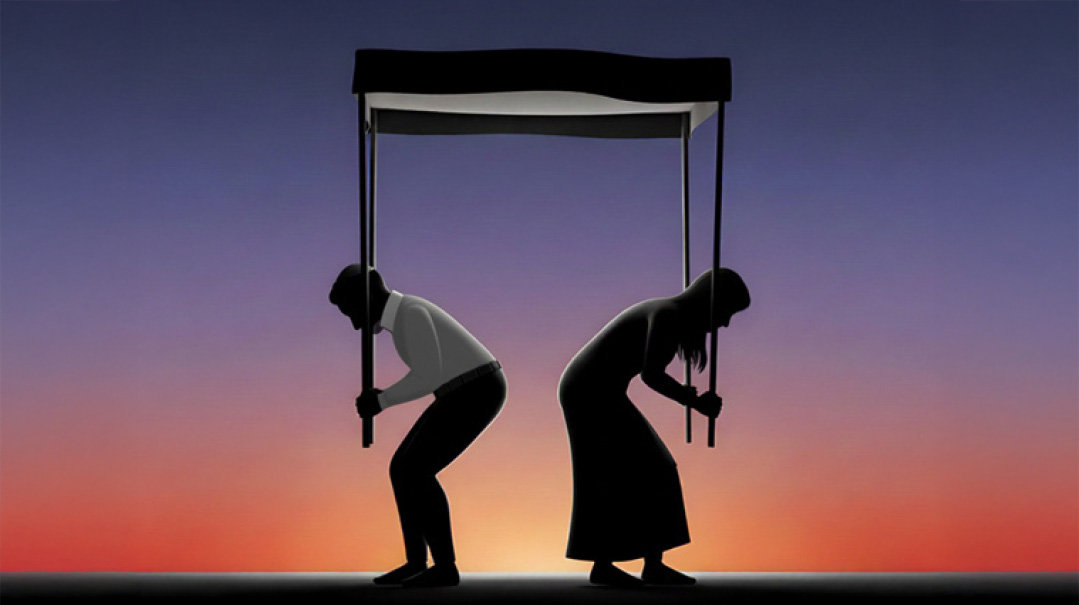Not Too Sweet, Not Too Salty

I
will forever link the Beit Knesset Hagadol of my neighborhood with the Kichels. Standing on the steps outside the ladies’ section, on my way in or out of a bar mitzvah, I made my first passionate speech about the promise and potential of the comic.
Back then the Kichels hadn’t gotten their name or their precise characters, but they were already taking shape. Writer Bracha Stein had been cajoling me for a steady humor slot in the magazine. I agreed that we could use something light and witty but I wasn’t excited about yet another page of running text. Then one day I thought of combining Bracha’s talent with whimsical artwork, in the form of a weekly comic. I was aiming for something charming yet incisive — a form of social commentary that would be fun and thought-provoking.
My idea must have thrown Bracha off-kilter. She usually isn’t at a loss for words, but this time she asked me for some time to think it over. In her next email, she wrote: I’m very intrigued but feel as though I’ve been asked to prepare a sonnet and am unsure whether that entails tuning a piano or mixing paint colors… I had been thinking of a much more standard humor column — 800ish words, funny approaches, and analyses of universal appeal issues.
It wasn’t exactly resounding approval. But I decided to keep pushing onward.
I’d worked with Chani Judowitz on one or two magazine projects and had met her once in person. Looking at her portfolio, I got the feeling she could build characters with personality and color.
She wasn’t as convinced as I was. In fact, she sent me a nice email recommending a different artist and sending me a link to the website. I checked out that site and decided to go back to Chani. At a bar mitzvah the next week, I spent most of the event on the staircase outside the simchah hall, convincing her that this was going to be the next great column and that she could do it.
When she sent me samples of different comic illustration styles, I started to get excited. We followed up by email, on the phone, then in person. Bracha and Chani slowly built a system to create the comic — concepts, then scripts, then sketches, then linework and, finally, color.
Pretty early on, we realized the comic needed a name. The first suggestion was “Tradition Soup.” It was clever — but we worried about the association with MSG. “Mandelbroit” was followed by “The Mandels.” From there it didn’t take long for Chani to come up with “The Kichels.” (And for her to recommend that every family member have a “ch” sound in his or her name — one of those subliminal threads that tie things together.)
My kids don’t usually enjoy the hours I spend on the computer at night, but they love watching Bracha and Chani’s magical teamwork as the Kichels take shape. It’s thrilling to see different iterations of a comic — raw sketch, precise linework, basic colors, and then shading.
But a lot of the work is less thrilling, and takes place at the conceptual and textual stages. With any form of communication, you have to know your audience. When it comes to humor, the nuances are even more important. So the Kichels team spends hours debating the tiniest nuances of characters and plot, and has even assembled an honorary board of Kichel advisors to help brainstorm for plots and hammer out details. At strange hours of day or night, they’ll be solving fateful dilemmas. Like: What sort of tie is a Lakewood bochur most likely to pick out? What kind of necklace should Nechama wear? Should the little boys be wearing colored shirts or white? What about hairstyles for high school girls — are they doing high ponies or low ponies these days?
Missing the nuances isn’t the only danger here. Humor is a powerful but risky tool. When you package messages in humor, you manage to share ideas without patronizing or preaching. At the same time, I’m not sure any other form of communication runs the same risk of making you look stupid. Bad reporting makes you look unprofessional, bad fiction makes you look out of touch, but bad humor makes you look dumb.
When it came to tone, we spent a lot of time and discussion figuring out that balance between too mild and overly peppery. We didn’t want the back page to become a repository of cynicism, an angry place where our readers’ lifestyle and values get ripped apart.
There was one more concern. A senior figure on our board spelled it out in an ominous email. “The whole idea of social commentary gets me nervous,” he wrote to me. “People are VERY bad at laughing at themselves.” But we were pretty confident that our readers do have the ability to see the comical or absurd in their lifestyles — and to enjoy the resulting conversation. At the very least, we wanted to give it a good try.
It’s been almost a year that the Kichels have been your neighbors down the block. (Or your cousins. Or you.) Judging by the feedback we receive, the times the column is posted online, the emails asking for permission to reprint, or the reports of teachers and speakers bringing the Kichels along to their speeches, they seem to have achieved the right texture — a balanced yet savory surface for our flavorful society’s quirks and whims. (Originally featured in Mishpacha, Issue 724)
Oops! We could not locate your form.







